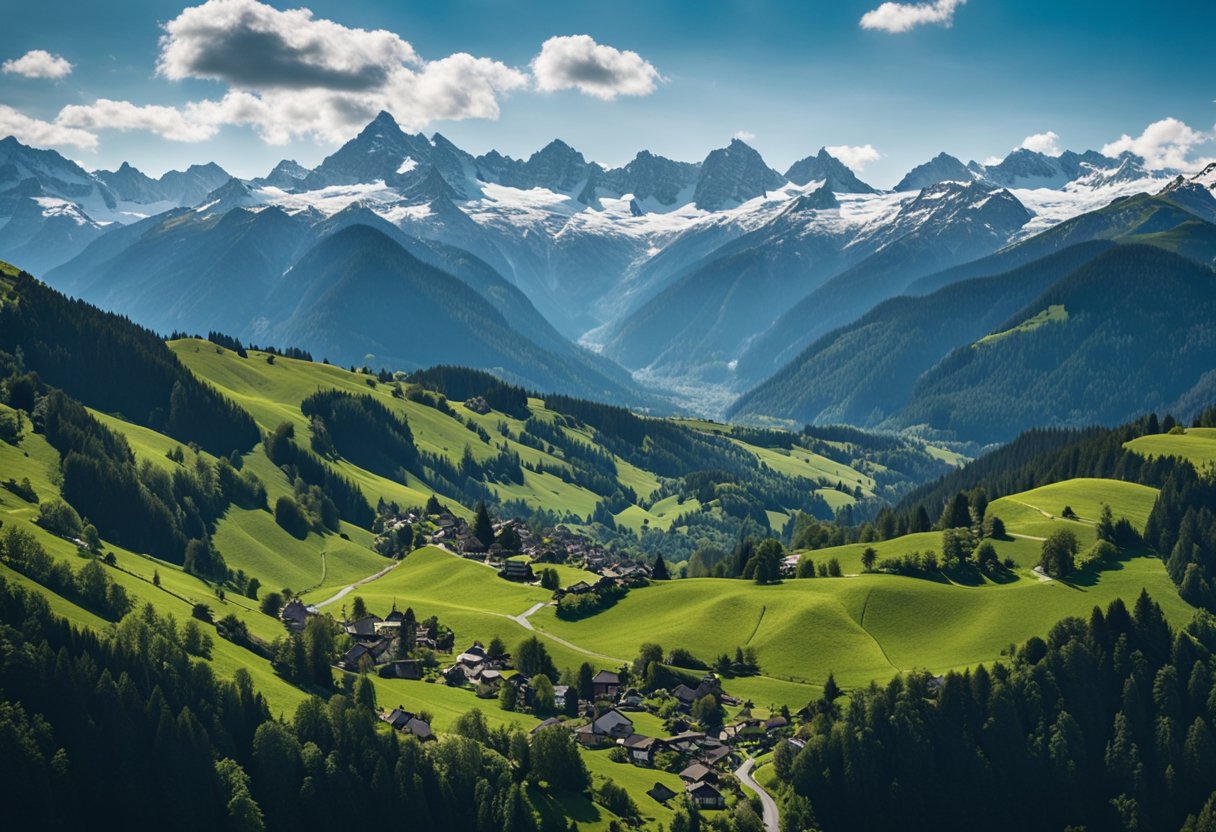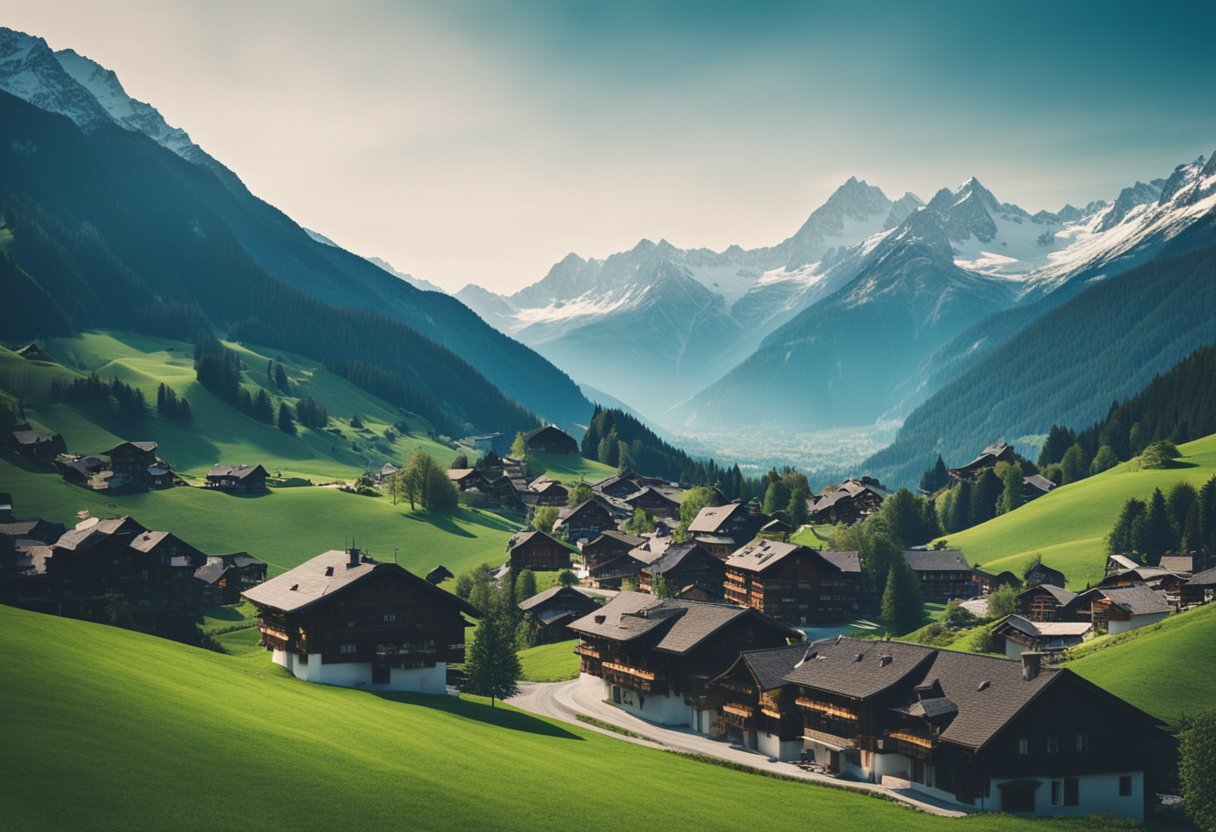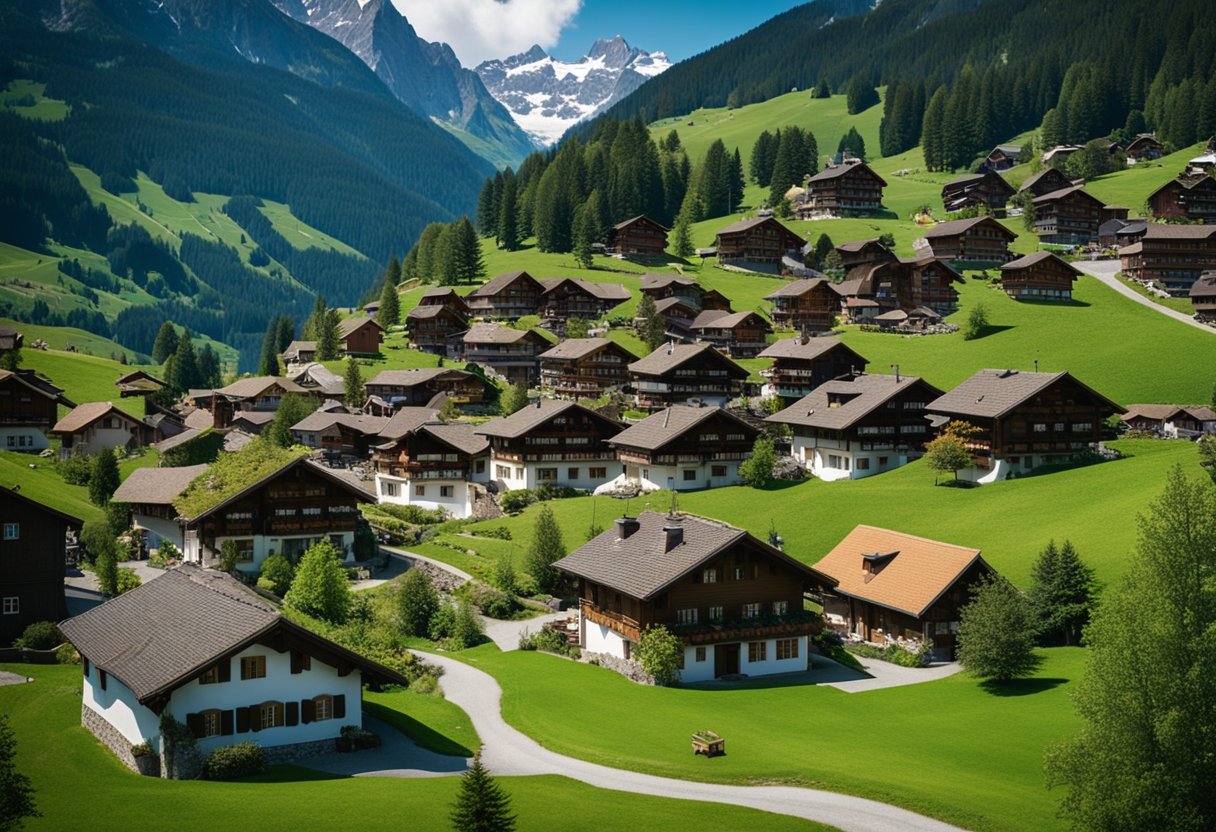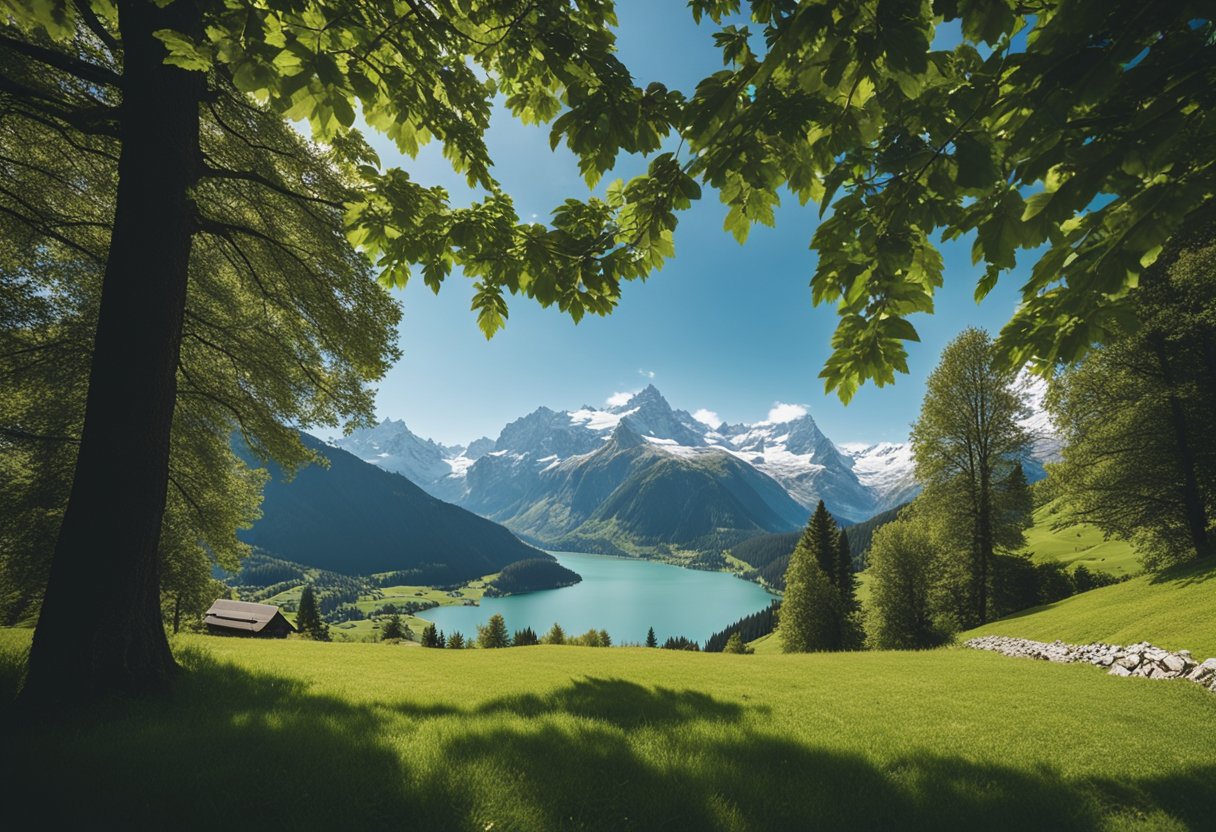The Swiss Alps: Exploring the Intersection of Natural Beauty and Political Neutrality

Updated On: April 07, 2024 by Yomna Salah
The Swiss Alps are not only a stunning natural treasure but also bear witness to Switzerland’s unique stance of neutrality in the complex theatre of European politics. They’ve silently observed the nation cultivating a role that’s both geographically central and politically singular on the continent. The sheer geography of the Alps has historically acted as a natural fortress, fostering Switzerland’s ability to maintain its independence and neutrality, especially during tumultuous periods in European history.

Switzerland’s renowned neutrality was formally recognised after the Napoleonic Wars, yet the country’s political and strategic significance in European affairs remains profound. From serving as a hub for international diplomacy to influencing economic stability, Switzerland navigates a path distinct from its neighbours. By maintaining neutrality, the Swiss Confederation has carved out a role that transcends mere geographic positioning, becoming central in the diplomatic landscape of Europe while preserving its sovereignty and cultural identity.
Switzerland: Heart of the Alps

Switzerland stands at the central juncture of the European Alps. It is not just a political heartland retaining neutrality but also a natural kernel where the interplay of environment and human activity is carefully balanced.
Geography and Climate
The Swiss Alps, a monumental range spanning the south of Switzerland, elevates the nation both figuratively and literally. Concomitant with Lake Constance in the north, the topography pivots from gentle hills to rugged peaks. Switzerland’s climate is as varied as its terrain, with altitudes shaping temperatures and precipitation—winter blankets the high peaks in thick layers of ice, while valleys may bask in mild sunshine.
Alpine Flora and Fauna
Alpine meadows burst into a palette of colours as they nurture a diverse array of flora. Rare edelweiss lives in harmony with vibrant bellflowers and alpenrose. Amidst this floral splendour, fauna like the majestic bear, previously endangered, is now making a cautious return, symbolising the region’s ongoing commitment to preservation.
Tourism and Recreation
A magnet for aficionados of the outdoors, the Swiss Alps propose a plethora of recreational pursuits. From Zermatt to St. Moritz, scenic train trips like the illustrious Glacier Express offer immersive experiences for visitors. Alongside, the renown of the Jungfraujoch highlights Switzerland’s aptitude in melding tourism with natural wonder, a finesse offering both thrill and tranquillity.
Environmental Challenges
We observe that the breathtaking landscapes are not immutable. The spectre of climate change looms, with ice caps waning and weather patterns in flux, presenting profound challenges. In response, Switzerland adopts measures that reflect a keen awareness of the fragile balance needed to sustain its alpine environment for future generations.
Historical Overview of Swiss Neutrality
Switzerland’s stance on neutrality has been a defining feature of its foreign policy and a significant factor in European politics. Throughout its history, Swiss neutrality has influenced its interactions during major conflicts and shaped its position in the global arena.
Emergence of Swiss Neutrality
Swiss neutrality was officially recognised in 1815 at the Congress of Vienna, a crucial turning point formalising Switzerland’s position of perpetual neutrality. This status was later affirmed by the major European powers and enshrined in the Hague Convention of 1907. The adoption of neutrality has its roots in the early 16th century, following the disastrous Battle of Marignano, which prompted the then-young Swiss Confederation to abstain from military conflicts. Understanding the historical reasons for Swiss neutrality helps underscore its impact on European diplomacy.
Neutrality in World Wars
During World War I, Switzerland maintained its stance of neutrality, becoming a safe haven for political refugees and international diplomacy. The country’s neutral status continued through World War II, where despite immense pressure, Switzerland remained uninvolved militarily, serving instead as a mediator and host for international negotiations. The complexities of Swiss neutrality during this era underscore the country’s role as a buffer state in times of international conflict.
Post-Cold War Neutrality
In the post-Cold War era, Switzerland has continued to navigate its position of neutrality amidst changing global dynamics. The nation joined the United Nations in 2002 but has steered clear of full NATO membership, upholding its long-standing policy of neutrality. Even as European politics has evolved, Switzerland’s dedication to neutrality remains a cornerstone of its diplomatic identity, emphasising peace and stability within the international community.
Political Structure and Sovereignty

In Switzerland, the political structure and manifestation of sovereignty align closely with its historical commitment to neutrality and self-governance, emphasising a unique federalist system that allows for cantonal autonomy while maintaining unified national governance.
Federal Constitution and Governance
Switzerland operates under a Federal Constitution, which lays the foundation for its governance and the distribution of power. This constitution establishes the Swiss Confederation, a federal state comprising 26 cantons, each with its distinctive traditions and authority. At the national level, the Federal Council, which serves as the executive authority, is a seven-member body that reflects a collegial system rather than focusing on a single head of state. Through this council, Switzerland upholds a multi-party democracy where decisions are reached by collective responsibility and consensus.
Cantonal Autonomy and Localised Power
Within the Swiss Confederation, the cantons, such as Uri, possess a high degree of sovereignty. Each canton has its constitution and retains significant powers, especially regarding education, healthcare, and law enforcement. However, the cantons also abide by federal laws and contribute to the collective foreign policy, which remains dedicated to neutrality. This combination of central authority and local autonomy enables Switzerland to maintain a balance between national unity and cantonal diversity.
Political Parties and Ideologies
The political landscape in Switzerland is shaped by a variety of political parties and ideologies, each representing different interests and visions for the country’s future. From progressive to conservative, Swiss parties actively participate in shaping policies and legislation. The ideologies they represent inform both national debates and cantonal governance and contribute to a dynamic political discourse that aligns with the country’s commitment to maintaining its sovereignty and neutrality.
Switzerland’s International Relations

Switzerland‘s international relations are defined by a commitment to neutrality, widespread bilateral and multilateral agreements, and an active role in international organizations. During crises, Swiss foreign policy has historically played a mediating role.
Bilateral and Multilateral Agreements
We recognise that Switzerland, though not a member of the European Union, engages in numerous bilateral agreements with the EU to ensure economic integration without sacrificing its autonomy. Furthermore, Switzerland hosts significant multilateral discussions, including the World Economic Forum in Davos, which brings together leaders to address global issues.
- Bilateral Agreements: These ensure access to European markets and cooperation in areas such as transport, education, and research.
- Multilateral Platforms: Switzerland offers a neutral ground for dialogue on international economic, political, and social issues.
Membership in International Organizations
Switzerland’s neutrality does not preclude it from participating in international bodies. Our membership in the United Nations strengthens our commitment to peace and security, while adherence to international law is central to our foreign policy.
- United Nations: We joined in 2002 and participated in peacekeeping efforts and humanitarian work.
- International Law: Compliance with and promotion of international law are key facets of our diplomacy in Geneva and beyond.
Foreign Policy during Crises
In crises, Switzerland’s stance is one of neutrality but also active diplomacy. Our nation serves as a mediator and provides humanitarian aid, remaining engaged without compromising our neutral position.
- Mediation Role: A history of facilitating dialogue between conflicting parties.
- Humanitarian Aid: Commitment to providing support in times of international crises.
In our conduct of international relations, we remain steadfast in our belief in dialogue, cooperation, and the peaceful resolution of disputes.
Economic Impact of Swiss Neutrality

Swiss neutrality has long been a defining feature of the country’s global economic interactions, fostering an environment conducive to trade and finance while influencing product export strategies.
Trade and Industry
Swiss trade and industry have reaped the benefits of neutrality, particularly in rural areas where agricultural practices, such as corn cultivation, are critical. We see rural communities leveraging the country’s neutral stance to sustain their agricultural exports without interruption, even in times of geopolitical tension. Furthermore, the Swiss machinery industry, bolstered by the image of neutrality, has established a reputation for reliability and quality, undeterred by external conflicts.
Banking and Finance
In banking and finance, Swiss neutrality has been pivotal. Notably, the presence of institutions like the World Bank and the International Monetary Fund emphasize Switzerland’s role as a financial mediator. The nation’s banks, by upholding a neutral and confidential stance, have become beacons of financial stability, attracting foreign capital and serving as safe havens, particularly during times of international financial uncertainty.
Swiss Products and Export
The export of Swiss products – especially jewellery and watches, known for their precision and excellence – benefits from the aura of neutrality. Swiss neutrality contributes to the market’s trust in purchasing high-quality products like gold without political or ethical concerns, further solidifying Switzerland’s export reputation. This trust ensures that the label ‘Made in Switzerland’ remains a powerful endorsement in international trade, directly impacting the economic landscape through sustained demand.
Cultural Identity and Community Life

In the Swiss Alps, the interplay between traditional customs and modern influx shapes the cultural identity and the structure of community life.
Language and Regional Customs
We find that the diversity of languages in Switzerland reflects its cultural mosaic. Regions such as Graubünden are characterised by a blend of German, Italian and Romansh-speaking communities, embodying linguistic diversity at its core. Similarly, Appenzell represents the historical customs through its distinct dialect and traditional folk music, portraying a cultural identity that is uniquely Swiss. Local festivities and agricultural practices stand as a testament to a way of life that is intrinsically linked to the Alps.
Social Integration and Immigration
The canton of Zürich, a hub of social integration, exemplifies the complex dynamics between Swiss people and immigrants. Although the Swiss People’s Party frequently voices conservative stances on immigration, urban areas of Zürich exhibit increasingly inclusive communities. Meanwhile, the Jura region, known for its tranquil towns and a strong sense of community, faces challenges and opportunities in integrating new residents, balancing between maintaining its identity and nurturing a diverse population base.
Arts and Sports
Within the arts and sports, the Swiss Alps serve as both a muse and an arena. Traditional alpine sports, such as skiing and mountaineering, highlight a community deeply connected to its environment, while regional art and craftsmanship, celebrated through events and local markets, reflect a pride in the artisan heritage. Entities such as festivals in Zürich champion both the contemporary art scene and traditional Swiss culture, ensuring an ongoing fusion of old and new.
Switzerland and Military Policy

Switzerland’s military policy is deeply intertwined with the country’s longstanding commitment to armed neutrality and sovereign defence. We’ll explore the cornerstones of Swiss defence mechanisms, from the militia system to the country’s approach to arms exports within the bounds of international law.
Armed Neutrality and Defence Strategies
At the core of Switzerland’s defence is its principle of armed neutrality, a commitment that has been preserved over centuries. Rooted in its historical formation as a neutral state, it has been a successful part of Switzerland’s political survival strategy. Swiss neutrality has remained a significant element within the contexts of both the Council of Europe and the wider international community.
Militia System and Military Service
We uphold a unique militia system, where military service is compulsory for Swiss males, emphasising the sovereignty and self-reliance of the nation. The system is designed to mobilise rapidly, ensuring that citizens are ready to defend our nation’s neutrality, with women being able to join voluntarily. This system ensures that a significant proportion of the population is trained and can be called upon for national defence.
Arms Exports and International Law
Switzerland also takes a carefully calculated stance on arms exports, which is governed by strict regulations and adherence to international law. While it maintains a neutral position, regulatory bodies scrutinise any potential exports to prevent violations of human rights or exacerbation of conflicts, reflecting the country’s commitment to uphold neutrality and maintain global peace.
Swiss Position in European Integration

Switzerland’s approach to European integration is defined by its unique bilateral relations with the European Union and cautious stance on monetary collaboration. Its position is continuously shaped by internal debates and direct democracy through referendums.
European Union and Bilateral Relations
Switzerland, a non-EU member, navigates its relationship with the bloc through a series of bilateral agreements that allow for economic cooperation without full integration. These agreements cover various sectors, ensuring the Swiss Confederation can participate in the single market on its own terms. A commitment to global economic integration while maintaining political restraint has been a hallmark of the Swiss since the federal state’s founding in 1848. Crystallising this delicate balance are the outcomes of various referendums that reflect the populace’s preference to step carefully with regard to EU matters, as illustrated by a historical lens on Switzerland’s Position in Europe and the World.
The Eurozone and Monetary Policy
Although surrounded by Eurozone countries, Switzerland has chosen to retain the Swiss Franc (CHF) as its currency, thereby staying independent of the European Central Bank’s (ECB) monetary policy. This allows for a national monetary policy that aligns closely with the country’s economic needs and objectives. Despite the proximity and substantial trade relations with the Eurozone, the Swiss National Bank operates independently, illustrating the country’s traditional stance on neutrality and self-determination.
Debate on European Integration
The debate over Switzerland’s role in European integration is ongoing. It encompasses a range of perspectives, from those who value the pragmatic benefits of cooperation to Eurosceptics cautious of deeper ties. The discussions encompass not only economic considerations but also the implications for Swiss neutrality and identity. As a historically neutral country not part of the North Atlantic Treaty Organization (NATO), Switzerland’s internal discourse on European integration continues to be a defining aspect of its foreign policy and national debates.
Contemporary Challenges and Debates

In examining the Swiss Alps, we navigate a complex landscape where environmental concerns intersect with political imperatives. Let us unravel these threads to understand the contemporary challenges and debates facing Switzerland.
Dealing with Global Crises
The Swiss Alps are not only an icon of awe-inspiring beauty but also a barometer for global crises. Confronted with climate change, we are witnessing how fragile alpine ecosystems can signal wider environmental shifts. Amidst this, Switzerland’s response to the Ukrainian crisis showcases the balance it strives to maintain between its humanitarian tradition and its commitment to neutrality. The nation’s independence is a cornerstone, even as we participate in international dialogues about security and crisis response.
Domestic Political Shifts
Political debate within Switzerland is robust, often reflecting varying opinions on how to handle issues such as immigration policy. This is illustrated by the rise of discussions that can, at times, have a xenophobic undertone, challenging our commitment to being an open and inclusive society. We must also wrestle with questions of political independence and direct democracy, ensuring that our domestic shifts are informed by both our enduring values and the evolving needs of our people.
Neutrality in the Age of Globalisation
Neutrality, a doctrine woven into the Swiss identity, faces new interpretations in the age of globalisation. As an economically interdependent state, we engage with the international community while preserving our non-aligned stance. This principle is tested as we navigate transnational threats and global security concerns, pushing us to reassess our role in this interconnected world without forsaking our heritage of neutrality.
Switzerland’s Legacy and Global Perception

We recognise Switzerland’s important role in peacekeeping and diplomacy and how its commitment to neutrality has become a central trait in the international sphere. Now, we’ll delve into the intricacies of Switzerland’s position in global politics through its peacekeeping efforts, diplomatic influence, and the branded concept of neutrality.
Switzerland’s Role in Peacekeeping
Switzerland, though famously neutral, has played a significant role in peacekeeping efforts across the globe. The nation has been diligent in promoting peace, predominantly through its hosting of diplomatic conferences and negotiations. Geneva, a Swiss city renowned worldwide, has often been the backdrop for significant international dialogues. This has been possible due to Switzerland’s longstanding policy of neutrality and the respect it commands on Swiss territory and beyond.
Diplomacy and International Reputation
Our diplomatic strategies resonate well with Switzerland’s reputation for strong international relations, fostered by the Geneva Conventions and humanitarian law’s foundation. Our diplomacy is further strengthened by being home to numerous international organisations. The presence of these entities stands as a testament to our country’s commitment to facilitating dialogue and our integral role in shaping policy on neutrality.
Neutrality as a Brand
The concept of neutrality has become intrinsically linked with Switzerland’s global identity. It’s not merely a policy but a brand that’s reflective of our steadfast approach to global challenges; it underscores our legacy in fostering a neutral stance in conflicts, underpinned by a strong legal framework—the Law of Neutrality. This brand of neutrality is not only a cornerstone of our foreign policy but has also shaped the global understanding of neutrality, influencing many nations’ approach to non-alignment.
Frequently Asked Questions

In this section, we’re addressing some of the key inquiries related to Switzerland’s long-standing policy of neutrality and how the Swiss Alps have played a role in shaping this stance.
Why has Switzerland maintained a stance of neutrality in European conflicts?
Switzerland has historically promoted neutrality to preserve its security and sovereignty in the midst of European conflicts. This policy has allowed it to act as a mediator and host for international diplomacy.
How has Swiss neutrality been affected by recent geopolitical tensions?
Recent geopolitical tensions have tested Swiss neutrality, yet the nation has remained committed to its non-participation in armed conflicts, all the while being actively involved in diplomatic efforts.
What historical events led to Switzerland’s policy of neutrality since 1815?
The Congress of Vienna in 1815 was pivotal in establishing Switzerland’s permanent neutrality, making it recognised by major European powers after the Napoleonic Wars. This was formalised further in the Treaty of Paris.
In what ways has the Swiss Alps region influenced the country’s political stance?
The rugged terrain of the Swiss Alps has historically provided a natural barrier, reinforcing Switzerland’s choice of neutrality and reducing the temptation for others to traverse its lands for military campaigns.
How does Switzerland’s neutrality align with its foreign policy practices?
Switzerland’s foreign policy is heavily influenced by its neutrality, focusing on humanitarian aid, hosting diplomatic negotiations, and involvement in peace-promotion organisations without participating in military alliances.
What are the implications of Switzerland remaining neutral during global conflicts?
Switzerland’s continued neutrality has implications such as serving as a diplomatic haven, facilitating negotiations, and being home to various international organisations, while also sometimes facing scrutiny for not taking sides in global conflicts.






